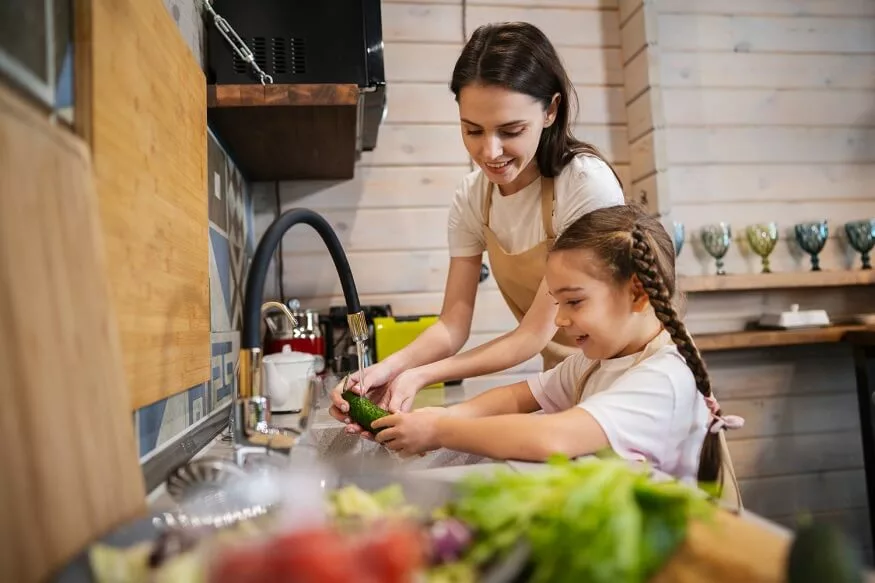In households around the world, the kitchen is often considered the heart of the home. It is a place where families gather to prepare and share meals, creating bonds and memories that last a lifetime. In this bustling hub of activity, children can play a vital role in supporting their parents and contributing to the overall harmony of the household.
How Kids Can Help Their Mothers In Kitchen
the numerous ways in which children can actively participate in the kitchen, cultivating essential life skills, fostering a love for cooking, and creating lasting family connections.
Simple Tasks for Little Hands
Children, even at a young age, can take on simple yet meaningful tasks in the kitchen. Washing vegetables, peeling fruits, or stirring ingredients are tasks that not only help parents with the workload but also enhance a child’s motor skills. These activities provide an excellent opportunity for bonding as parents guide their little ones through the steps, creating a shared experience.
Meal Planning and Grocery Shopping:
Engaging children in the meal planning process not only introduces them to the concept of balanced nutrition but also develops decision-making skills. Parents can involve their children in creating weekly menus, considering preferences and nutritional needs. Additionally, taking children along for grocery shopping excursions offers practical lessons in budgeting, organisation, and an understanding of where food comes from.
Educational Cooking Experiences:
Cooking can be a fun and educational experience for children. Parents can introduce them to the basics of measurements, fractions, and even science through simple kitchen experiments. Baking, for example, provides an excellent opportunity to explore the chemistry behind ingredients and their reactions. These activities not only make learning enjoyable but also lay the foundation for a lifelong appreciation of the culinary arts.
Cultural Exploration through Cuisine
Incorporating diverse cuisines into family meals not only expands children’s palates but also opens doors to learning about different cultures. Parents can involve their children in researching and preparing dishes from various countries, fostering an appreciation for diversity. This culinary exploration becomes a delightful way for families to connect with the wider world from the comfort of their own kitchen.
Setting and Clearing the Table
Teaching children to set and clear the table instils a sense of responsibility and contributes to the overall orderliness of mealtimes. This seemingly simple task also emphasises the importance of teamwork within the family unit. As children take on these responsibilities, they develop a sense of pride in their contribution to the family’s shared spaces.
Safety First
Instilling kitchen safety habits from a young age is crucial. Parents should educate their children about the potential hazards in the kitchen and teach them the importance of handling utensils and appliances with care. As children grow older, they can progress to more complex tasks, but a solid foundation in safety ensures their competence and confidence in the kitchen.
Encouraging Creativity
Cooking is both an art and a science, and encouraging children to express their creativity in the kitchen can be incredibly rewarding. Whether it’s decorating cupcakes, arranging a colourful salad, or creating their own sandwich combinations, allowing children to express themselves through food not only boosts their confidence but also fosters a love for cooking as a form of creative expression.
Sharing Family Recipes
Passing down family recipes from one generation to the next is a cherished tradition. Parents can involve their children in the preparation of these time-honoured dishes, creating a sense of continuity and connection to family heritage. These shared cooking experiences become treasured memories and contribute to a strong sense of family identity.
Celebrating Special Occasions
The kitchen is often the hub of activity during special occasions and celebrations. Children can actively participate in the planning and preparation of festive meals, contributing to the overall joy of the event. Whether it’s baking a birthday cake, making holiday cookies, or preparing a special dinner, involving children in these moments not only creates lasting memories but also imparts a sense of the importance of shared traditions.
Developing a Lifelong Appreciation for Food
By involving children in the kitchen from a young age, parents have the opportunity to instil in them a lifelong appreciation for food. Teaching them about the origins of ingredients, the value of mindful eating, and the joy of sharing meals with loved ones fosters a healthy relationship with food that extends into adulthood.
Also Read: 15 Ways for mothers to connect with their Kids
10 Dishes Kids Can Prepare At Home
- Peanut Butter and Banana Sandwich: Spread peanut butter on whole-grain bread and add banana slices for a quick and nutritious sandwich.
- Cheese Quesadillas: Fill tortillas with shredded cheese and heat in a pan until the cheese is melted for a simple and tasty quesadilla.
- Homemade Pizza Bagels: Top halved bagels with tomato sauce, cheese, and favourite toppings for a personalised mini pizza treat.
- Fruit Kabobs: Thread chunks of colourful fruits like strawberries, grapes, and melon onto skewers for a refreshing and fun snack.
- Yoghurt Parfait: Layer yoghurt with granola and fresh berries to create a delicious and visually appealing parfait.
- Pasta with Tomato Sauce: Boil pasta and mix with store-bought or homemade tomato sauce for an easy and satisfying pasta dish.
- Vegetable Wraps: Fill whole-grain wraps with a variety of sliced vegetables, cheese, and a favourite dressing for a healthy and portable meal.
- Ants on a Log: Spread peanut butter on celery sticks and top with raisins for a playful and nutritious snack.
- Fruit Smoothies: Blend together a combination of fruits, yoghurt, and a splash of juice to create a tasty and nutritious smoothie.
- Egg Salad Sandwich: Mix boiled and mashed eggs with mayonnaise, salt, and pepper, then spread on bread for a classic and protein-packed sandwich.
Also Read: Tips to Help Parents Adjust to Baby’s Changes
The kitchen is a dynamic space where families come together to nourish their bodies and souls. Children, with their boundless curiosity and eagerness to learn, can actively contribute to this communal experience. By involving children in the various aspects of cooking, from simple tasks to more complex responsibilities, parents not only lighten their own load but also equip their children with essential life skills, a love for learning, and a deep appreciation for the joys of family and food. EuroSchool believes that in the kitchen, children can become little chefs, creating a legacy of shared meals and cherished memories that will last a lifetime.











